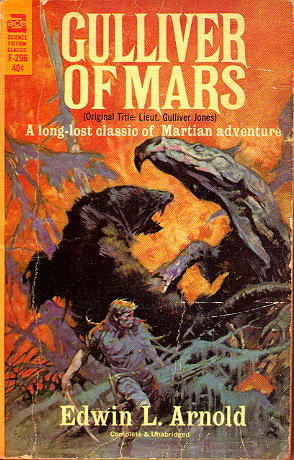Chapter XX — Gulliver of Mars
byChapter XX brings the protagonist back into the heart of Martian civilization, only to find himself more disconnected than ever. While the people burst into celebration at the return of Princess Heru, he feels a strange distance from their joy. Their enthusiasm seems shallow, focused on flowers, music, and pageantry rather than the looming reality of conflict. The protagonist, once hailed as a savior, is now barely acknowledged. His concerns about the enemy remain unspoken by the crowd, swallowed in the festive haze. As he walks through the decorated streets, the gap between his experience and theirs grows larger.
To cope, he turns to the distractions that Martian life offers—wine, laughter, and dance. For one night, he joins them in their forgetfulness, trying to erase the bitterness of feeling forgotten. But the next morning, sobriety returns with a weight. The hero looks at the city with clearer eyes and feels the hollowness of their joy. Heru, though rescued, is now preparing to consult a ceremonial globe to determine the timing of her royal marriage. The act, rooted in Martian custom, feels foreign and absurd to him. Though he first reacts with a surge of jealousy, the emotion quickly fades into a strange, creeping indifference.
The apathy of those around him begins to shape his own thoughts. He watches the people gather in the palace square with vacant expressions, their anticipation more about ritual than reality. Even Heru seems distant, wrapped in the dreamlike order of tradition. Then chaos erupts. Without warning, Ar-hap’s army crashes into the city, scattering flowers and crowds in equal measure. Panic spreads, and the celebration collapses into screams and smoke. The hero, jolted from his trance of resignation, moves instinctively. The battle arrives not with honor, but with ambush.
Within the palace, destruction reigns. Yet in the eye of the storm, Prince Hath sits still. His calm is not courage but defeat. When the protagonist pleads for action, Hath explains that fate has already chosen Heru’s path and that resistance is unnecessary. Such fatalism infuriates the hero. With fire climbing the palace walls and enemies seizing the city, he turns from words to action. He races through halls in search of Heru, pushing past guards and rubble, determined to free her from this collapse. Eventually, he spots her—held by slave hands, being led away like a prize.
In that instant, clarity returns. Heru, fragile but proud, meets his gaze as he tears her free from her captors. The moment hangs suspended between destruction and escape. Around them, the palace groans under fire and falling stone. But the urgency fuels his every step. He pulls her through shattered doors, through smoke-choked corridors, past the frozen nobles who can no longer distinguish bravery from blindness. Outside, the city is barely recognizable.
In the chaos, something unexpected appears—a magical rug, familiar and strange. It lies draped over debris, glowing faintly, humming with power. The same object that once flung him from Earth to Mars now calls again. Heru, weak and silent, is laid gently beside it. He hesitates only briefly, torn between love and survival, between staying to fight a lost cause and returning to a life that feels distant. Then he makes the wish—simple and desperate. He wants to go home.
The world spins. The air thickens. And then everything stops. He awakens on a stone step in New York, cold pavement under his hands, noise filling his ears. The city, uncaring and vast, embraces him with its usual indifference. Mars is gone. The palace, the battles, the stars—all replaced by the hard, familiar outlines of his own world. No fanfare greets his return. No one knows where he has been. But something inside him has changed.
Back on Earth, reality feels smaller. Yet within him remains the memory of a distant red sky, a princess with violet eyes, and a people too gentle to fight their fate. He cannot tell anyone where he was. Not in a way they’d believe. But as he rises and walks down the street, he knows that part of him will always belong to that other world—a place where dreams were real, and where he once mattered deeply, even if only for a moment.

